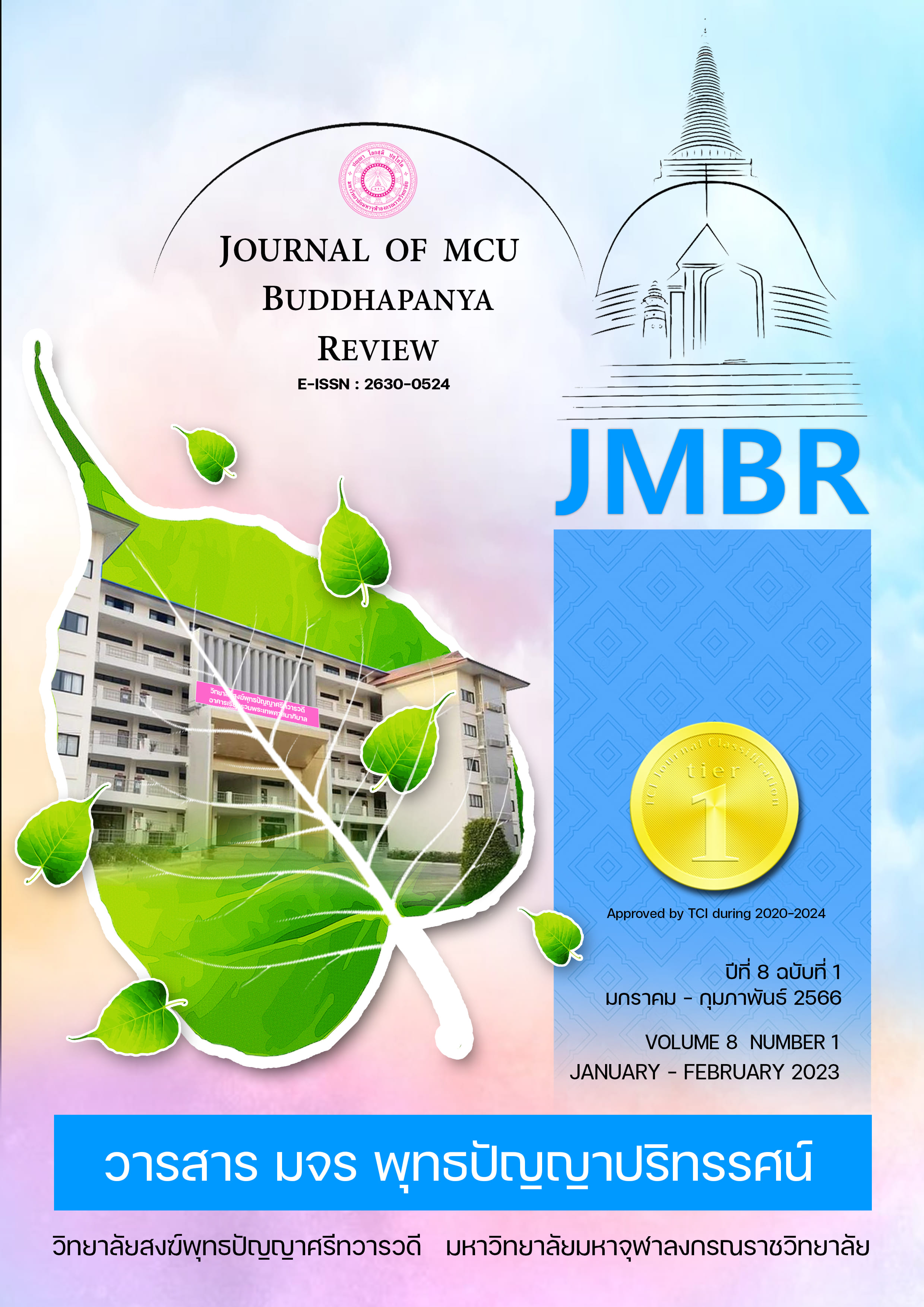การรอบรู้ดิจิทัลและความสามารถในการเรียนรู้ออนไลน์
คำสำคัญ:
การศึกษาปัจจัยการรอบรู้ดิจิทัล, , ทัศนคติ, , การรับรู้ความสามารถของตนเองบทคัดย่อ
บทความวิจัยนี้มีวัตถุประสงค์เพื่อ (1) ศึกษาปัจจัยการรอบรู้ดิจิทัล ทัศนคติต่อการเรียนรู้ออนไลน์ของนักศึกษาในระดับอุดมศึกษา (2) ศึกษาปัจจัยด้านการรับรู้ความสามารถของตนเองทำให้การเรียนรู้ออนไลน์ของนักศึกษามีประสิทธิภาพ (3) ประเมินระดับการมีส่วนร่วมด้านวิชาการ การมีส่วนร่วมของผู้เรียนกับสังคมโดยรอบ การมีส่วนร่วมกับผู้สอนและการมีส่วนร่วมกับแพลตฟอร์มในการเรียนรู้ออนไลน์ โดยมีกรอบแนวคิดของงานวิจัยประยุกต์จากแนวคิดการรอบรู้ดิจิทัล ความรู้ทัศนคติและพฤติกรรม การมีส่วนร่วมและการรับรู้ความสามารถตนเอง งานวิจัยนี้ใช้การสำรวจโดยการเก็บข้อมูลจากแบบสอบถามออนไลน์ ด้วยวิธีการสุ่มตัวอย่างจากนักศึกษาที่กำลังศึกษาอยู่ในระดับอุดมศึกษา จำนวน 552 คน และวิเคราะห์ข้อมูลด้วยแบบจำลองสมการโครงสร้าง
ผลการวิจัยพบว่า (1) การรอบรู้ดิจิทัลเป็นปัจจัยที่ช่วยเสริมให้ผู้เรียนสามารถเรียนรู้ออนไลน์ได้อย่างมีประสิทธิภาพ ทักษะความสามารถในการค้นหาข้อมูลเป็นปัจจัยสำคัญที่ทำให้ผู้เรียนมีความรอบรู้และพัฒนาทักษะการเรียนรู้ในการใช้งานเทคโนโลยีได้ดียิ่งขึ้น ทัศนคติเชิงบวกส่งผลให้ผู้เรียนเกิดการยอมรับการเรียนออนไลน์ (2) การรับรู้ความสามารถของตนเองเชิงบวกเป็นปัจจัยที่ช่วยกระตุ้นให้ผู้เรียนสร้างความมั่นใจและตอบสนองต่อการเรียนรู้ออนไลน์ได้อย่างมีประสิทธิภาพมากยิ่งขึ้น (3) ระดับการมีส่วนร่วมด้านวิชาการในการทำงานกลุ่มร่วมกับเพื่อนเป็นไปในทิศทางตรงข้าม การเรียนออนไลน์ทำให้ผู้เรียนที่มีส่วนร่วมด้านวิชาการอย่างมากในช่วงที่เรียนในห้องเรียนแต่เมื่อต้องปรับเป็นการเรียนออนไลน์ทำให้คนกลุ่มนี้มีการตอบสนองเชิงวิชาการในการทำงานกลุ่มตามที่ได้รับมอบหมายน้อยลง ระดับการมีส่วนร่วมของผู้เรียนกับสังคมโดยรอบ การมีส่วนร่วมกับผู้สอนและการมีส่วนร่วมกับแพลตฟอร์มที่ใช้ในการเรียนรู้ออนไลน์ในระดับมาก
เอกสารอ้างอิง
Kesinee Juthawichit. (1999). Communication for local development. 2. Nakhon Pathom: Nakhon Pathom Rajabhat Institute.
Jitthiporn Siritanon. (2000). Comparison of confidence and structural accuracy of Adjacent to computer subjects. Bangkok: Ramkhamhaeng University.
Woraphot Wongkitrungruang and Atip Jit Rerk. (2011). New skills of the future: Education for the 21st century. Bangkok: Open World.
Suraphong Sothon Sathien. (1990). Communication with society. Bangkok: Chulalongkorn University.
Saengdaw Thinharwong, (2015). Participatory learning: from theory to the practice of literature for children. Phetchaburi: Phetchaburi Rajabhat University.
Onjira Netaree. (2000). Attitude towards the training of the Government Savings Bank employee. Bangkok: Ramkhamhaeng University.
Aree Thammachang. (2016). The attitude and behavior of learners to proactive learning management by integrating content through modern teaching media. Songkhla: Academic Journal Faculty of Humanities and Social Sciences Prince of Songkla University
Anubha Rohatgi a, et.al. (2016). The role of ICT self-efficacy for students' ICT use and their achievement in a computer and information literacy test. Journal of Computers & Education. 102, 103-116.
Bandura A. (1986). Social Foundations of Thought and Action. Englewood Cliffs, NJ: Prentice Hall.
Bandura A. (2010). Perceived Self-Efficacy in Cognitive Development and Functioning. Educational Psychologist. 28(2), 117-148.
Cassidy, S., & Eachus, P. (2002). Developing the computer user self-efficacy (CUSE) Scale: Investigating the relationship between computer self-efficacy, gender and experience with computers. Journal of Educational Computing Research, 26(2), 133-153.
Enas Said Abulibdeh. (2011). E-learning interactions, information technology self-efficacy and student achievement at the University of Sharjah, UAE. Journal of Australasian Journal of Educational Technology. 27(6), 1014-1025.
Ester van Laar a, et.al. (2017). The relation between 21st-century skills and digital skills: A systematic literature review. Journal of Computers in Human Behavior. 72, 577-588.
Insung Jung, Seonghee Choi, Cheolil Lim & Junghoon Leem. (2002). Effects of Different Types of Interaction on Learning Achievement, Satisfaction and Participation in Web-Based Instruction. Journal of Innovations in Education and Teaching International. 39(2), 153-162.
Justine Ferrer, Allison Ringer, Kerrie Saville, Melissa A Parris, Kia Kashi. (2020). Students’ motivation and engagement in higher education: the importance of attitude to online learning. Journal of Higher Education. 2020.
Tai-Kuei Yu a. et.al. (2017). Understanding factors influencing information communication technology adoption behavior: The moderators of information literacy and digital skills. Journal of Computers in Human Behavior. 71, 196-208.
Usher, E. L., & Pajares, F. (2008). Sources of self-efficacy in school: Critical review of the literature and future directions. Review of Educational Research, 78(4),
Yingqi Tang & HungWei Tseng. (2013). Distance Learners' Self-efficacy and Information Literacy Skills. Journal of Academic Librarianship. 39(6), 517-521.
ดาวน์โหลด
เผยแพร่แล้ว
รูปแบบการอ้างอิง
ฉบับ
ประเภทบทความ
สัญญาอนุญาต
ลิขสิทธิ์ (c) 2023 วารสาร มจร พุทธปัญญาปริทรรศน์

อนุญาตภายใต้เงื่อนไข Creative Commons Attribution-NonCommercial-NoDerivatives 4.0 International License.



